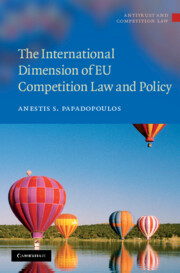Book contents
- Frontmatter
- Contents
- List of Tables
- Acknowledgements
- Abbreviations
- Table of Cases
- Table of Legislation
- Table of Treaties and Agreements
- 1 Introduction, Structure of the Book and Method
- 2 The National and International Dimensions of Competition Law and Policy
- 3 Bilateral Enforcement Cooperation Agreements
- 4 Bilateral Trade Agreements which Include Competition Provisions
- 5 Plurilateral Regional Agreements which Include Competition Provisions
- 6 The Role of Competition Law and Policy of the EU in Multilateral Negotiations on Competition
- 7 Conclusions: Main Findings of the Study
- Appendix 1 Economic Theories Applied to Competition Law
- Appendix 2 General Information about Plurilateral Regional Agreements
- Bibliography
- Index
Appendix 1 - Economic Theories Applied to Competition Law
Published online by Cambridge University Press: 10 November 2010
- Frontmatter
- Contents
- List of Tables
- Acknowledgements
- Abbreviations
- Table of Cases
- Table of Legislation
- Table of Treaties and Agreements
- 1 Introduction, Structure of the Book and Method
- 2 The National and International Dimensions of Competition Law and Policy
- 3 Bilateral Enforcement Cooperation Agreements
- 4 Bilateral Trade Agreements which Include Competition Provisions
- 5 Plurilateral Regional Agreements which Include Competition Provisions
- 6 The Role of Competition Law and Policy of the EU in Multilateral Negotiations on Competition
- 7 Conclusions: Main Findings of the Study
- Appendix 1 Economic Theories Applied to Competition Law
- Appendix 2 General Information about Plurilateral Regional Agreements
- Bibliography
- Index
Summary
Classical theory
It was in the late seventeenth century when Adam Smith published his seminal work, The Wealth of Nations, in which the theory of the market economy was invented. Smith, influenced by other major scholars of this era, such as Cantillon, Turgot and Hume, who had already tried to explain why competition appears in markets, or put simply, why an individual buyer wants to outbid his rivals, was the first to use the concept of competition as a ‘general organising principle of economic analysis and the economic society’.
He considered individuals as egoistic creatures with no understanding of common interest or socially benefiting solutions, and described competition as a race by individuals which would make these individuals improve their production and force the price of the traded products to its ‘natural level’, or result in the lowering of profits to a minimum. It follows that Smith saw competition as a process which would restrain individuals from colluding on prices at the expense of society. Against this natural tendency of individuals, Smith did not propose the establishment of a competition or anti-monopoly policy, since on a theoretical level he actually paid no attention to monopolies. Nonetheless, it has been suggested in the literature that Smith advocated some kind of competition policy, since he proposed the following in order to maintain the process of competition: (i) the state must ensure that external institutional arrangements that define property rights would guarantee legal protection for market transactions, protect freedom of choice and prohibit unfair behaviour; (ii) there must be internal institutional arrangements which reduce unfair behaviour by moral rules; and (iii) he recommended that politicians should not follow any suggestions made by entrepreneurs.
- Type
- Chapter
- Information
- The International Dimension of EU Competition Law and Policy , pp. 268 - 277Publisher: Cambridge University PressPrint publication year: 2010



